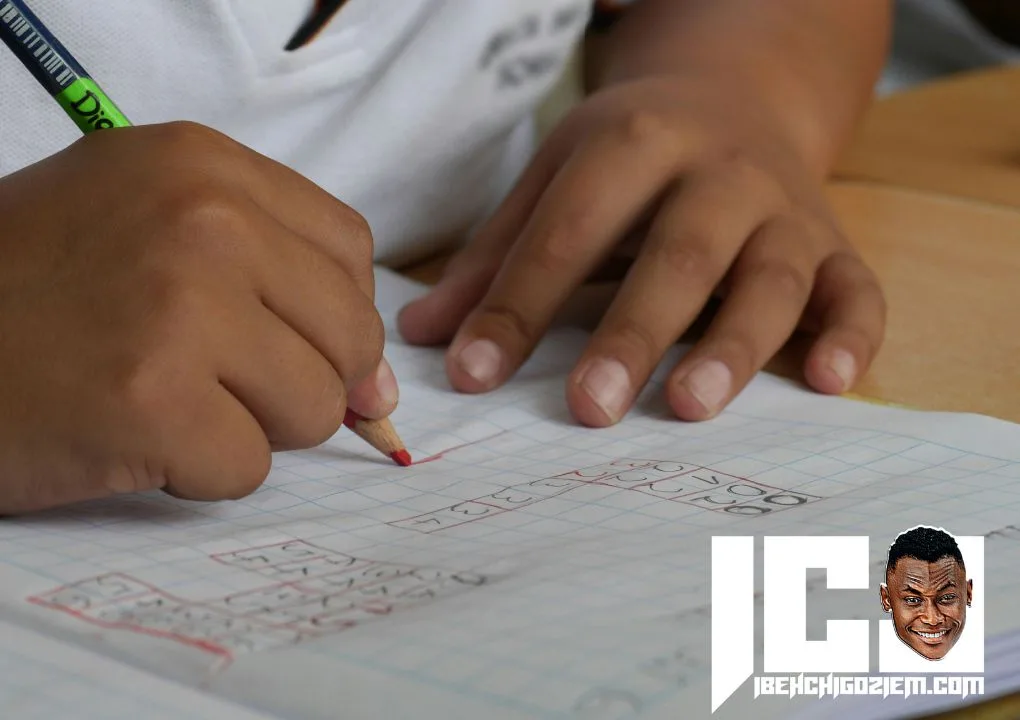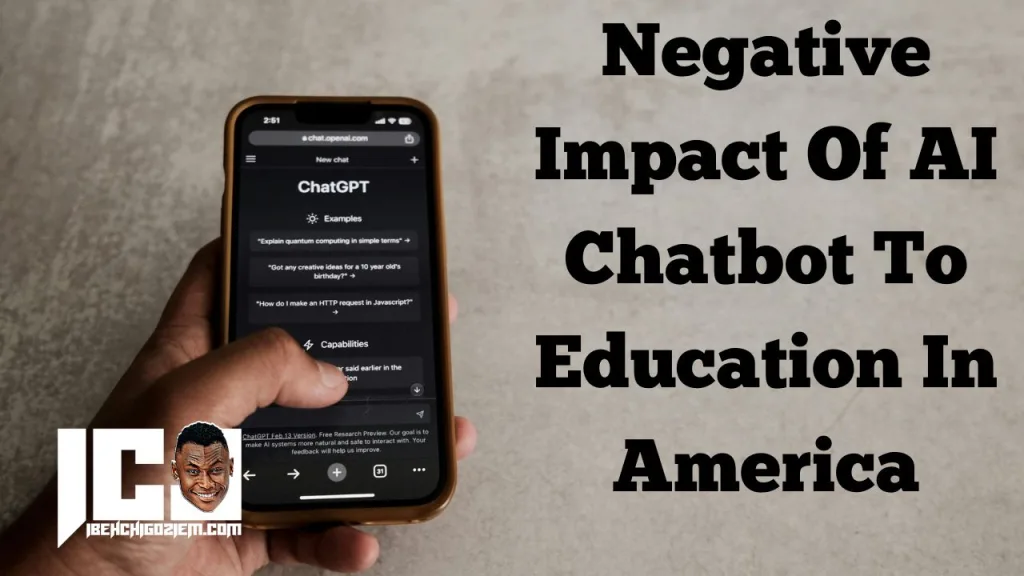Negative Impact Of AI Chatbot To Education In America
AI chatbots are powerful tools that leverage artificial intelligence technologies to interact with users. They have the potential to revolutionize various industries and applications, providing personalized and efficient solutions to user queries.
This technology has an immeasurable impact on the educational sphere especially when it comes to carrying out research or doing further studies.
However, it is important to consider the ethical and privacy implications of chatbot technology and implement safeguards to ensure the responsible and ethical use of this great technology in American education.
What is an AI Chatbot?

An AI chatbot, short for artificial intelligence chatbot, is a computer program that utilizes artificial intelligence technologies to simulate human-like conversations with users. These chatbots are designed to interact with users in a natural language format, responding to queries and tasks conversationally.
AI chatbots have gained popularity in recent years due to advancements in natural language processing and machine learning algorithms, allowing them to understand and generate text with a high degree of accuracy.
One of the key features of AI chatbots is their ability to learn and adapt over time. Through a process known as machine learning, chatbots can analyze large amounts of data to improve their responses and performance. This allows them to provide more accurate and relevant answers to user queries, creating a more engaging and personalized experience for users.
AI chatbots can be deployed in a variety of applications and industries, including customer service, education, healthcare, and e-commerce. In customer service, chatbots can assist users with common inquiries, provide product recommendations, and even process transactions.
In education, chatbots can act as virtual tutors, helping students with homework assignments, providing study materials, and offering personalized learning experiences.
The technology behind AI chatbots is complex and involves a combination of natural language processing, machine learning, and deep learning techniques.
ALSO, READ; 15 Best Free AI & Machine Learning Online School 2024 with Certificates
Natural language processing allows chatbots to understand and interpret human language, while machine learning algorithms enable them to learn from data and improve their performance over time.
Deep learning techniques, such as neural networks, are used to process and analyze large datasets to generate contextually relevant responses.
Despite their many benefits, AI chatbots also present challenges and limitations. One common concern is the potential for bias in chatbot responses, as they are trained on existing datasets that may contain biased or inaccurate information. Privacy and security issues are also a concern, as chatbots may collect and store sensitive user data during interactions. Hence this article will take you through some of the negative impacts of AI Chatbot on American education as well as recommendations on how to minimize its impacts.
AI Chatbot and Education in America
Artificial intelligence (AI) and its applications are becoming more widely accepted in many spheres of our lives, including customer service, healthcare, e-commerce, and education. These applications range from routine, at-home chores to professional settings.
Artificial intelligence has enormous promise for the educational sector since it can help students become more prepared for the future, even though there are some things to be cautious of, such as intellectual, ethical, and legal challenges.
Artificial intelligence can assist students in selecting the best schools, learning more quickly, graduating on schedule, and feeling ready and confident when they join the workforce. Additionally, it can support teachers in improving instruction through more successful customized lesson plans and initiatives.
Whatever one’s position and viewpoint on AI, it is undeniable that it has changed and will continue to change college life and post-graduation employment.
In higher education, artificial intelligence is paving the way for more inclusivity, accessibility, and assistance for instructors, administrators, and students through the following:
- Quick data interpretation
- Better and more useful virtual assistants and chatbots
- Recognizing plagiarism and fraud and taking action
Because artificial intelligence has so much to offer in terms of improving student learning, it is crucial that higher education institutions embrace it rather than be afraid of its negative impact as it processes both positive and negative impacts on American education.
By keeping an eye on which tools students use most frequently, monitoring and analyzing those tools to ensure optimal performance and efficacy, and soliciting feedback and input regarding issues and desired features from users, educational institutions can make beneficial use of artificial intelligence for both faculty and free students.
It is imperative for all sectors, especially the educational sector, to embrace and leverage artificial intelligence as a means of improving people’s lives, as it has come to stay with us.
10 Negative Impacts of AI Chatbots On Education In America
AI chatbots can have both positive and negative impacts on education in America. However here of some potential negative impacts of AI chatbots on America’s Education:
1. Dependency On Technology

Dependency on technology in the educational sector refers to the reliance that students and instructors have on technological devices and systems in their daily lives.
Students who become overly dependent on AI chatbots may experience a decline in critical thinking skills, problem-solving abilities, and creativity.
Relying too heavily on AI chatbots for answers can hinder students’ development of independent thinking and research skills.
Additionally, excessive use of AI chatbots may lead to reduced human interaction, which is essential for social and emotional development.
In other words, excessive dependence on AI chatbots can lead to negative consequences such as decreased social interactions, reduced critical thinking skills, and potential cybersecurity risks. Hence, students need to strike a balance between utilizing technology for its benefits and maintaining healthy offline relationships and activities.
Educators and students alike should be mindful of striking a balance between utilizing AI chatbots as a helpful tool and fostering independent learning and critical thinking skills. Encouraging students to engage in diverse learning experiences, collaborate with peers, and seek guidance from human educators can help mitigate the negative effects of dependency on AI chatbots.
2. Lack of personalized learning

Another negative impact of AI chatbots on American education is the lack of personalized learning. AI chatbots may not be able to provide the same level of personalized learning experience as human teachers, potentially hindering student growth and development.
While AI chatbots can provide automated responses and support to students, there is a concern that they may not offer truly personalized learning experiences tailored to individual student needs and learning styles.
The reliance on AI chatbots in education could lead to a one-size-fits-all approach that does not adequately address the diverse learning requirements of students resulting from different ideologies and backgrounds. Without personalized learning opportunities, students may struggle to engage with the material, leading to decreased motivation, comprehension, and overall academic performance.
To mitigate this issue, educators and developers need to prioritize the integration of AI technology in a way that enhances personalized learning rather than hinders it. By leveraging AI chatbots as tools to supplement personalized instruction from teachers, schools can create a more dynamic and effective learning environment that caters to the unique needs of each student.
Ultimately, the key lies in striking a balance between the benefits of AI technology and the importance of personalized learning in American education.
3. Reduced social interaction
Increased use of AI chatbots in education may lead to decreased face-to-face interaction among students, impacting social skills and emotional intelligence.
Although AI chatbots can offer valuable support in educational settings by providing instant feedback, personalized assistance, and access to resources, there is the risk of students becoming overly reliant on these digital tools for communication and learning which might bring about reduced social interaction.
One of the key concerns is that excessive interaction with AI chatbots may lead to a decrease in face-to-face communication skills, empathy, and social interactions among students. This could potentially impact their ability to collaborate effectively, build relationships, and navigate real-world social situations.
To address this issue, educators can incorporate strategies that balance the use of AI chatbots with opportunities for meaningful human interaction in the learning process. Encouraging group discussions, collaborative projects, and peer-to-peer interactions can help students develop social skills and communication abilities while still benefiting from the advantages of AI technology.
This is achievable by fostering a holistic approach to education that values both technological innovation and interpersonal connections. American education can mitigate the potential negative effects of AI chatbots on social interaction.
4. Privacy concerns

The more students expose themselves to AI the wider the window of risk of leaking their secret data to the outside world. Hence there may be concerns about the privacy and security of student data when interacting with AI chatbots, especially if sensitive information is shared.
Privacy concerns related to the negative effects of AI chatbots in American education are a valid consideration. AI chatbots in educational settings may collect and store sensitive student data, such as personal information, academic performance, and behavioural patterns. There is a risk that this data could be misused, shared without consent, or vulnerable to security breaches, leading to potential privacy violations and harm to students.
To address these concerns, educational institutions need to implement robust data protection measures, including encryption, access controls, and regular security audits, to safeguard student privacy.
On this issue, educators and administrators should prioritize the ethical use of AI chatbots in education, emphasizing the importance of data privacy and confidentiality. By promoting a culture of responsible data handling and privacy protection, American educational institutions can harness the benefits of AI chatbots while safeguarding student privacy rights.
5. Inequality in access
The next negative impact of AI chatbots on American education is inequality in access. It is a fact that not all students may have equal access to AI chatbot technology, leading to disparities in educational opportunities and outcomes.
Inequality in access to AI-powered educational resources can exacerbate existing disparities in American education. Students from disadvantaged backgrounds may not have equal access to technology and internet connectivity, limiting their ability to benefit from AI chatbots and other AI tools in their learning process. This lack of access can widen the achievement gap between students who have access to AI technology and those who do not, leading to unequal educational outcomes.
Furthermore, if AI chatbots are not designed with diverse student populations in mind, there is a risk of perpetuating biases and reinforcing existing inequalities in education. For example, if AI chatbots are trained on data that is not representative of all students, they may provide inaccurate or biased information.
To address this issue, policymakers, educators, and technology developers need to prioritize equity in access to AI technology in education. This includes ensuring that all students have access to the necessary technology and internet infrastructure, as well as promoting the development of inclusive and unbiased AI chatbots that cater to the diverse needs of students from different backgrounds.
We can work towards a more inclusive and fair educational system for all students by addressing inequality in access and promoting equity in AI education.
6. Job displacement
There is a fear that AI chatbots could potentially replace human teachers, leading to job displacement and a decrease in the quality of education. This also forms part of the negative effect of AI chatbots on education in America.
The integration of AI chatbots in educational settings can lead to concerns about the displacement of certain roles traditionally performed by human educators and support staff. While AI chatbots can offer benefits such as personalized learning experiences and immediate access to information, there is a risk that they may replace human educators in certain tasks, leading to job displacement and potential job insecurity.
Educational institutions need to consider the ethical implications of AI chatbot implementation and ensure that human educators are not marginalized or replaced by technology. By focusing on the collaborative use of AI chatbots to enhance teaching and learning experiences, rather than as a substitute for human educators, American education can mitigate the negative effects of job displacement while leveraging the benefits of AI technology
7. Over-reliance on standardized testing
Next on our list of 10 negative impacts of AI chatbots on education in America is Over-reliance on standardized testing. Standardized testing has been criticized for promoting a narrow focus on rote memorization and test-taking skills, potentially limiting the development of critical thinking, creativity, and problem-solving abilities in students.
When AI chatbots are used to prepare students for standardized tests, there is a risk of further reinforcing this test-centric approach to learning.
Over-reliance on AI chatbots for test preparation may lead to a reduction in teacher-student interactions, personalized learning experiences, and the development of essential soft skills that are not easily assessed through standardized tests.
Additionally, there is a concern that AI chatbots may inadvertently perpetuate biases present in standardized testing materials, further exacerbating issues of equity and fairness in education.
To address these challenges, educators and policymakers should prioritize a holistic approach to assessment that values diverse forms of student achievement beyond standardized test scores. By incorporating AI chatbots as tools to support rather than replace human teachers, American institutions can leverage technology to enhance learning outcomes while preserving the importance of critical thinking, creativity, and social-emotional skills
8. Lack of emotional support
Lack of emotional support from both students and instructors is also part of the negative impact of AI chatbots on education in America. AI chatbots may not be able to provide the same level of emotional support and guidance as human teachers, impacting student well-being and mental health.
While AI chatbots can provide valuable educational support and assistance, they may lack the ability to offer the emotional support and empathy that human educators and counsellors can provide. This can be particularly concerning in educational settings where students may require emotional guidance, encouragement, or understanding.
The reliance on AI chatbots for educational interactions could potentially lead to a lack of emotional connection and support for students, impacting their overall well-being and mental health.
It is essential for educators and developers to recognize the limitations of AI chatbots in providing emotional support and to ensure that human interaction and emotional guidance remain integral components of the educational experience.
9. Decreased motivation
Students may become disengaged or demotivated if they feel that AI chatbots are impersonal or unable to provide meaningful feedback and encouragement.
While AI chatbots can offer immediate assistance and support to students, there is a concern that over-reliance on these tools may lead to decreased motivation among students to actively engage in learning and problem-solving. Students may become dependent on AI chatbots to provide answers and solutions, rather than developing their critical thinking skills and perseverance in tackling challenges independently.
To address this issue, educators and policymakers can implement strategies to balance the use of AI chatbots with opportunities for students to engage in hands-on learning experiences, collaborative projects, and critical thinking exercises that foster intrinsic motivation and a growth mindset. By emphasizing the importance of effort, resilience, and creativity in the learning process, educators can help students maintain their motivation and drive to succeed, even in the presence of AI technology.
It is essential for stakeholders in American education to carefully consider the role of AI chatbots in the classroom and ensure that their integration supports, rather than hinders, students’ motivation and learning outcomes
10. Ethical or Legal concerns
There may be ethical or legal considerations surrounding the use of AI chatbots in education, such as bias in algorithms or the potential for misuse of student data.
Ethical concerns related to the negative impact of AI chatbots on education in America include issues such as data privacy, algorithmic bias, over-reliance on technology, and the potential for AI chatbots to diminish the quality of human interaction and personalized learning experiences.
Developers and educators must address these concerns by implementing ethical guidelines, ensuring transparency in the use of AI technology, and promoting responsible deployment of AI in educational settings. The focus should be on leveraging AI chatbots as a tool to enhance learning experiences and support educators, rather than as a substitute for human interaction and critical thinking skills.
Conclusion
AI chatbots are of immense importance in every sector, especially in the educational sector. However it has its negative impacts on education in America hence, It is important for educators and policymakers to carefully consider these potential negative impacts and implement strategies to mitigate them while leveraging the benefits that AI chatbots can bring to education.


